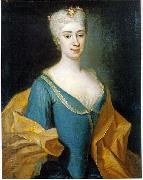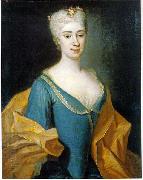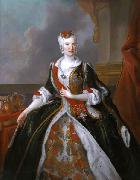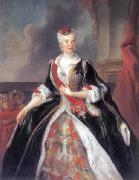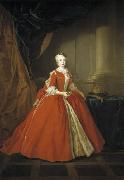Louis de Silvestre Oil Painting ReproductionAll Louis de Silvestre Oil Paintings(23 June 1675 - 11 April 1760) was a French portrait and history painter. He was court painter to King Augustus II of Poland, and director of the Royal Academy of Arts in Dresden. Sylvestre was born in Sceaux, south of Paris, the third son of Israel Silvestre, the notable engraver and drawing-master to the Dauphin himself. Louis was taught initially by his father, then trained under Charles Le Brun and Bon Boullogne; he completed his studies in Rome, where he met Carlo Maratta, whose work had a great influence on him. After his return to Paris, Sylvester entered the Royal Academy in 1702 and was appointed professor in 1706. |
|||

|
|||
|
|
|||
|
||||||||
| Louis de Silvestre (23 June 1675 - 11 April 1760) was a French portrait and history painter. He was court painter to King Augustus II of Poland, and director of the Royal Academy of Arts in Dresden. Sylvestre was born in Sceaux, south of Paris, the third son of Israel Silvestre, the notable engraver and drawing-master to the Dauphin himself. Louis was taught initially by his father, then trained under Charles Le Brun and Bon Boullogne; he completed his studies in Rome, where he met Carlo Maratta, whose work had a great influence on him. After his return to Paris, Sylvester entered the Royal Academy in 1702 and was appointed professor in 1706. |
||||||||
|
|
||||||||
| Gemälde IDENTIFIZIERUNG:: 74192 Moszinska. olgemalde von Louis de Silvestre. Friederike Alexandrine Gräfin von Moszinska. olgemalde von Louis de Silvestre. Oil Painting by Louis de Silvestre. between 1730 an 1740 cjr |
||||||||
|
|
||||||||
| Gemälde IDENTIFIZIERUNG:: 75600 Friederike Alexandrine Grafin von Moszinska Deutsch: Friederike Alexandrine Gräfin von Moszinska. Ölgemälde von Louis de Silvestre. Oil Painting by Louis de Silvestre. Date between 1730 an 1740 cyf |
||||||||
|
|
||||||||
| Gemälde IDENTIFIZIERUNG:: 76400 Portrait of Maria Josepha of Austria 1737(1737) Oil on canvas 118 x 155 cm (46.5 x 61 in) cjr |
||||||||
|
|
||||||||
| Gemälde IDENTIFIZIERUNG:: 76567 Portrait of the Queen Maria Josepha in Polish costume 1737(1737) Oil on canvas 118 x 155 cm (46.5 x 61 in) cjr |
||||||||
|
|
||||||||
| Gemälde IDENTIFIZIERUNG:: 76938 Portrait of the Princess Maria Amalia of Saxony in Polish costume. 1738(1738) Oil on canvas 181 x 260 cm (71.3 x 102.4 in) cjr |
||||||||
|
|
||||||||
| VORHERIGER KÜNSTLER NÄCHSTER KÜNSTLER | ||||||||
|
|
||||||||
|
Louis de Silvestre (23 June 1675 - 11 April 1760) was a French portrait and history painter. He was court painter to King Augustus II of Poland, and director of the Royal Academy of Arts in Dresden. Sylvestre was born in Sceaux, south of Paris, the third son of Israel Silvestre, the notable engraver and drawing-master to the Dauphin himself. Louis was taught initially by his father, then trained under Charles Le Brun and Bon Boullogne; he completed his studies in Rome, where he met Carlo Maratta, whose work had a great influence on him. After his return to Paris, Sylvester entered the Royal Academy in 1702 and was appointed professor in 1706. |
||||||||
|
|
||||||||
|
KONTAKTIEREN Sie UNS |





